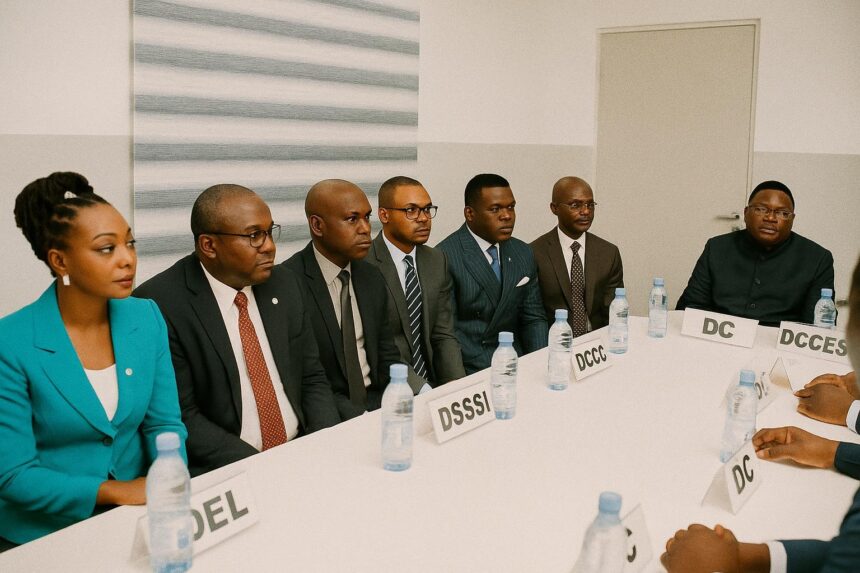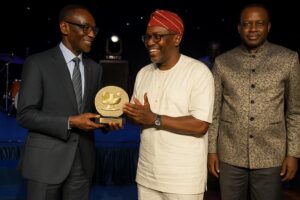Administrative Renewal and Its Strategic Rationale
With measured ceremony on 29 July in Brazzaville, seven central directors and one provincial antenna chief took their oaths of office before senior officials of the Ministry of Finance, Budget and Public Portfolio. The reshuffle, enacted by Prime Minister Anatole Collinet Makosso’s 25 July decree, forms part of the routine cyclical mobility of the higher civil service. Yet, beyond procedure, the move dovetails with President Denis Sassou Nguesso’s pledge to consolidate macro-economic stability through a more agile, technology-driven public administration (official communiqué, 29 July 2023).
The portfolio affected—engineering and security of information systems, application development, innovation management, technical support, communication and change management, finance and control—collectively shapes the digital spine of Congo’s public finance architecture. By choosing cadres with demonstrable experience in e-governance, the ministry seeks to accelerate a transformation that international partners such as the African Development Bank have identified as a pre-condition for broad-based growth (AfDB Country Strategy, 2022).
Who Are the New Stewards of Fiscal Technology?
At the helm of the Directorate of Information Systems Engineering stands Jean-Édouard Itoua, an alumnus of École Polytechnique de Paris and a former systems architect at the Central African Banking Commission. Adjacent to him, Clarisse Mabiala Makanda, the sole woman in the cohort, now oversees Application Development and Technological Innovation after coordinating the nationwide biometric census in 2021. Meanwhile, Colonel-engineer Jérôme Moukassa assumes responsibility for Cyber-Security and Infrastructure, bringing with him two decades spent modernising the army’s telecoms backbone.
The ministry’s internal culture also receives attention: Didier Batchiombi inherits the Communication and Change Management brief, tasked with steering staff toward data-driven habits, whereas veteran auditor François Kimbembé chairs the Directorate of Administrative and Financial Services, a post that will interact closely with the newly created Control of Management office led by Paul-Arsène Maboundou. Beyond the capital, Giscard Nguimbi takes charge of the Kouilou departmental antenna, anchoring reform at the sub-national tier.
Digital Transformation as Policy Fulcrum
Finance Minister Jean-Baptiste Ondaye, whose message was conveyed by his administrative and legal adviser, left little ambiguity: “Your nomination is no leisurely promenade; measurable results are non-negotiable.” His insistence echoes the administration’s 2022–2026 National Development Plan, which places dematerialisation of fiscal procedures high on the agenda. Electronic tax declarations have risen by 45 % since the pilot phase launched in 2021, according to ministry dashboards, but bottlenecks persist in system interoperability and user outreach.
The new directors inherit unfinished business: migration to the Integrated Public Financial Management System (SIGFiP), consolidation of the single treasury account, and alignment with the Economic and Monetary Community of Central Africa (CEMAC) transparency directives. Their success would not only streamline domestic revenue mobilisation but also reinforce Congo-Brazzaville’s commitments under its 2023 Extended Credit Facility arrangement with the International Monetary Fund (IMF Country Report No. 23/56).
Anticipated Impact on Public Finance Governance
Diplomatic observers in Brazzaville discern a dual calculus behind the appointments. On the one hand, a rejuvenated technical cohort can inject operational momentum at a moment when oil-price volatility continues to test fiscal buffers. On the other, visible progress in governance indicators strengthens the Republic’s hand in negotiations for concessional financing and debt reprofiling (Paris Club communiqué, June 2023).
Private-sector interlocutors are equally attentive. “If the ministry digitises customs payments and broadens the electronic taxpayer ledger, compliance costs will fall and predictability will rise,” argues Florent Obambi, chief economist at Credit du Congo. His assessment is substantiated by regional precedent: Rwanda’s e-filing initiative trimmed clearance times by 40 % within three years, a benchmark Brazzaville now seeks to emulate.
Regional and International Echoes of a Domestic Shuffle
In Central Africa, where administrative inertia often blunts reformist zeal, Congo-Brazzaville’s decision to entrust critical digital portfolios to specialised technocrats has drawn cautious approval from multilateral observers. An adviser to the World Bank’s Governance Global Practice notes that “stable political leadership combined with technocratic depth tends to unlock donor confidence”. Already, a 15 million-euro grant from the European Union for customs modernisation, approved in May, is contingent upon demonstrable progress in cyber-security and data integrity—areas now overseen by Colonel Moukassa.
Beyond financial matrices, the appointments resonate with the African Union’s Digital Transformation Strategy 2030, which emphasises sovereign data management and cross-border payment platforms. Congo’s alignment with these continental goals subtly enhances its soft-power profile, a factor not lost on diplomats who weigh regional posture alongside domestic policy.
Measured Optimism Amid High Expectations
The ceremony’s warm applause has already ceded to the routine hum of servers and the cold calculus of key-performance indicators. Success will be judged less by the novelty of titles than by the reduction in manual paperwork, the integrity of real-time dashboards and the confidence ratings of creditors. Yet the symbolism of seating a younger, tech-savvy cadre at the core of public-finance governance is hard to miss.
For Congo-Brazzaville, navigating post-pandemic recovery while meeting climate-linked infrastructure needs demands fiscal dexterity. The seven directors now in office embody the administration’s wager that such dexterity can be engineered through algorithms, fibre cables and disciplined management. Whether they transform promise into performance will become evident in quarterly revenue reports rather than ceremonial speeches, but—for now—Brazzaville’s ledgers look decidedly fresher.





















